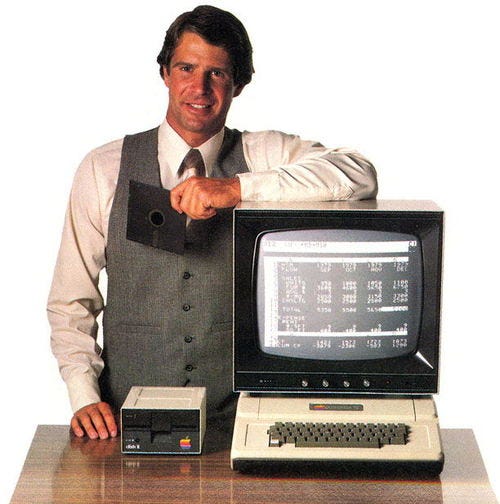Artificial intelligence will create new categories of work even as it destroys others, say advocates. But not everybody's so sure of a bright AI future.

The apocalypse came for accountants in 1979.
That was the year VisiCorp released VisiCalc, the very first PC spreadsheet program, that ran on an Apple II computer.
Before then, accountants spent literally days making each individual spreadsheet on paper, filling out cells with fine pencils and figuring out the math by hand, and later, on desktop adding machines. My father was an accountant and my mother was a bookkeeper; I grew up in the 70s, and I remember the kitchen and dining tables occasionally covered with green sheets of ledger paper and pink flakes from pencil erasers.
With VisiCalc, spreadsheets could be prepared in seconds.
End of the world for accountants, right?
Not so much.
As related on the Freakonomics podcast, since 1980 we have added 600,000 accountants to the economy. Now that spreadsheets are cheaper, businesses want more of them. A lot more. And spreadsheets can be used for so many things -- for anesthesiologists computing doses, middle school teachers tracking class attendance. At Light Reading, we use spreadsheets to plan conference coverage.
VisiCalc "allowed spreadsheet users, not just accountants, the opportunity to become enormously more creative and productive. It created more work opportunities and also made the Apple II personal computer popular," Allen Sneider, an accountant who beta tested VisiCalc, and who was its first registered owner, tells Light Reading.
But the news isn't all good: Since 1980, the US has lost 400,000 jobs related to accounting, namely accounting clerks and bookkeepers, the people who actually did the math to fill spreadsheet cells.
Figure 1: World-Ender  A VisiCalc user with an Apple II. Accountants feared VisiCalc, the first spreadsheet software, would take their jobs.
A VisiCalc user with an Apple II. Accountants feared VisiCalc, the first spreadsheet software, would take their jobs.
(Photo: Dave Winer, CC BY-SA 2.0)
Now, we're facing a possible job apocalypse, not just for accounts, but for everybody, brought on by artificial intelligence. Machines that can play chess and Go today will be able to do everybody's job -- and soon -- leaving most of us no way to make a living. Consider these headlines:
Not so fast, say AI proponents. Yes, AI will destroy jobs. But AI will also create them.
For examples of technology destroying jobs, you can go back further than the spreadsheet. Much further.
In the Mad Men era, every middle manager (almost all men) had their own private secretary (almost all women). There aren't many secretaries left.
A "computer" used to be a job, rather than a thing. From the late 18th Century until the digital age, peaking in World War II, computers were people who made calculations now made by the electronic machines we've named for them.
Figure 2: Human Computer  People like Katherine Johnson, a NASA employee shown here in 1966, worked as "computers" for centuries. Johnson later worked as a physicist and mathematician. She's a character in the 2016 movie Hidden Figures.
People like Katherine Johnson, a NASA employee shown here in 1966, worked as "computers" for centuries. Johnson later worked as a physicist and mathematician. She's a character in the 2016 movie Hidden Figures.
And computers weren't the first time technology reduced or eliminated jobs. It's been going on for hundreds and thousands of years. 90% of Americans were farmers in 1862, compared with 2% by 1996.
If you want to look way back: In ancient Greek and Roman times, being an oarsman on a ship was a valuable skill, and a pretty good job. Advances in ship propulsion put oarsmen out of work.
And yet, despite thousands of years of technology taking jobs, we still have jobs.
Technology, including AI, changes the nature of work, but it doesn't reduce the need for work, Steve Abrams, VP in the Watson Group and IBM Corp. (NYSE: IBM) distinguished engineer, tells Light Reading.
"Technology has changed the nature of work that people could do since the first time that somebody figured out if they hooked a tool up to an animal they could plow more fields with less labor," Abrams said. "At each step along the way, there was initial fear -- 'oh my gosh this will put people out of work.' There was a period that re-skilling was needed. But there was still a need of people doing work. Higher level work."
IBM uses the term "cognitive computing," rather than "artificial intelligence," because it sees machines as working with people rather than replacing them, Abrams says. The company published a set of principles guiding ethical AI and cognitive systems last month.
There are things that computers can't do, and won't be able to do for the foreseeable future. "There is always a need for human judgment, always a need for compassion. There is always a need for things we wouldn't give over to a computer," Abrams says.
"Like any technology, AI displaces jobs and creates new jobs," says Melanie Mitchell, professor of computer science at Portland State University.
As one example of new job creation: AI visual recognition software needs data that is labeled by humans, so AI can learn from it. Humans need to label faces and other objects, so AI knows what they are and how to recognize those objects in other images. "This is a whole new economy for people that can label data for AI programs, so AI programs can learn," Mitchell says.
These are often low-paying jobs. However, AI often creates higher-level jobs for software engineers, computer scientists and people who support them, Mitchell says.
"Right now, if you're a software engineer that knows something about AI, you have a huge number of job opportunities, because there are so many companies investing in it," Mitchell says.
She adds, "AI takes jobs away and creates new jobs, which I think is true for many technologies throughout the history of technology. It's hard to predict where that will go."
Next Page: Tech Creates Jobs, but Also Destroys Them
IBM CEO Ginni Rometty said in December the company plans to create 25,000 "new collar" positions over the next four years, in fields including data science and the cloud. (See IBM's Rometty Announces 25,000 'New Collar' US Jobs Ahead of Trump Meeting.)
But IBM has also been laying off thousands of employees, according to reports.
Technology creates jobs, but it also destroys them.
"It's already happening in a lot of cases," Mitchell says. "One example is robotics. There are many robots in manufacturing. Amazon, for example, uses robots in their warehouses." And robots are used extensively in manufacturing. "Is that AI? I think many people would consider it to be AI. It certainly has taken a lot of jobs."
She adds, "My brother used to work in a field called medical transcription, where he would transcribe recordings from doctors about their cases. Now that's done by speech recognition programs. They've gotten good enough to do that."
Still, predictions of an AI jobs apocalypse are premature, Mitchell notes. Many jobs will be impervious to AI for a long time, even if AI eventually does figure them out.
"There's a phenomenon in all kinds of technology, particularly AI, that the last 10% of getting technology to work is the hardest," Mitchell says.
For example, with regard to self-driving cars, we already have cars that can drive autonomously on roads. But driving still requires human common sense and knowledge that will be difficult to program, Mitchell says.
If you're driving past a construction site and one of the workers makes a hand-waving gesture for you to move along, that kind of gesture will be difficult for a computer vision system to distinguish from other gestures. "That kind of gesture is still beyond the ability of computer vision to interpret reliably," Mitchell says.
"There are a lot of special cases that humans can deal with because they have common sense, background knowledge. That's hard to evolve into an AI system," Mitchell says. "We're not consciously aware of how much common sense comes into special cases, such as driving."
Mitchell says she believes self-driving cars "are a little further away than people believe." When they arrive, they'll replace many transportation jobs. "But they will also create jobs in a lot of ways that people can't forecast. It's hard to predict what the net effect will be on the economy," Mitchell says.
Google (Nasdaq: GOOG) chairman Eric Schmidt agrees.
"There is no reason advances in machine learning have to cost society more jobs than they create," Schmidt says in a Newsweek editorial last month:
History has actually shown us that technological progress tends to lead to greater prosperity, more jobs, safer workplaces and higher standards of living. That's what happened globally during the Industrial Revolution as people transitioned away from agriculture to industry -- a process that is still occurring in developing countries. And it's what happened in the U.S. and Europe during the boom years immediately following World War II, when the spread of technologies like refrigeration, automatic telephone switches and airplane travel forever changed our economies and vastly improved the lives of nearly everyone. Although this meant fewer milkmen, phone operators and ocean liner crews, job growth actually accelerated during this time.
Still, societies need to guide the transition by investing in digital skills education and career retraining. In November, Google "made a multimillion-pound commitment to provide five hours of free digital skills training for every person in the U.K., set to take place throughout this year. Since 2011, we've built six campuses throughout the world solely to give local innovators and advocates a place to congregate, learn from one another and create the jobs of the future. To ensure the gains from technology don't lead to greater inequality, all governments and businesses should strengthen social safety nets and expand corporate benefits like equal pay and family leave," Schmidt says.
So we can all rest easy right? While artificial intelligence might destroy some jobs, it'll make new, better jobs to replace them, right?
Maybe not.
"Automation may be destroying new jobs faster than it's creating new ones," according to an article on Tech Republic ("... but all hope isn't lost," the article adds optimistically).
"There's no economic law that says 'You will always create enough jobs or the balance will always be even', it's possible for a technology to dramatically favour one group and to hurt another group, and the net of that might be that you have fewer jobs," Erik Brynjolfsson, economist at the Massachusetts Institute of Technology (MIT) and co-author of the book The Second Machine Age, tells Tech Republic.
As for me: I know at least my job is safe.
Or is it?
Since 2015, a company called Automated Insights has offered a service called Wordsmith. The service is a copywriting AI that writes "insightful, personalized content" -- including articles that run on Fox Business, Yahoo Finance and local newspapers.
Here's Automated Insights' article about Amazon's most recent earnings. And here's mine.
I think mine is jazzier. On the other hand, Automated Insights' software doesn't require a salary, benefits or sleep. It doesn't complain when it's asked to travel. And it doesn't waste its colleagues' time making wisecracks on conference calls.
So maybe I'd better look for new work. Perhaps I can label cat photos to train visual recognition software?
Related posts:
— Mitch Wagner, 
 , Editor, Light Reading Enterprise Cloud
, Editor, Light Reading Enterprise Cloud
About the Author(s)
You May Also Like











